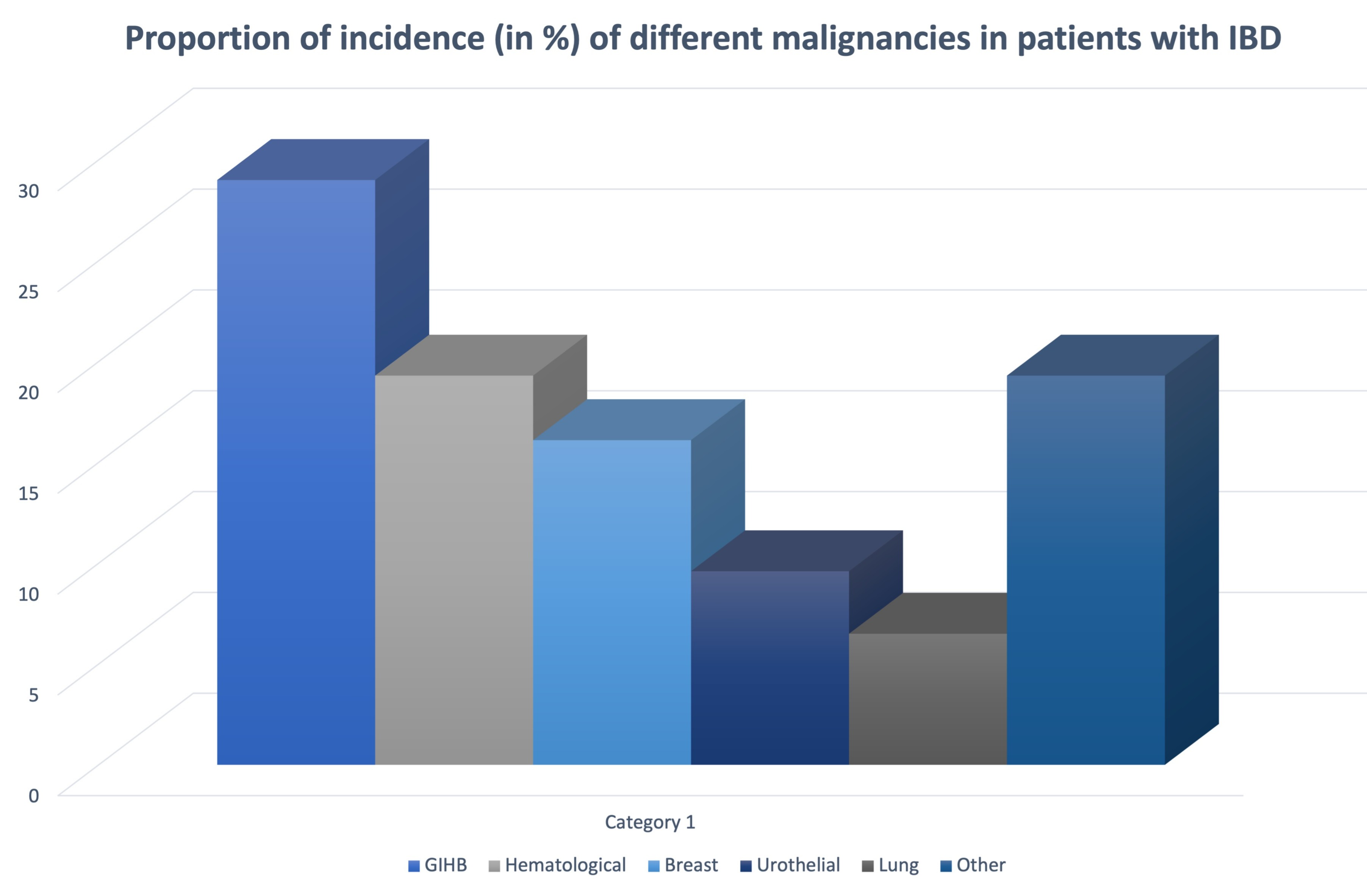Back
Poster Session E - Tuesday Afternoon
E0366 - Inflammatory Bowel Disease and Malignancies – A Multi-Centric Retrospective Analysis
Tuesday, October 25, 2022
3:00 PM – 5:00 PM ET
Location: Crown Ballroom

Garvit Chhabra, MD
University of Louisville
Louisville, KY
Presenting Author(s)
Anuja Abhyankar, MD, Garvit Chhabra, MD, Michael Eiswerth, DO, Gerald Dryden, MD
University of Louisville, Louisville, KY
Introduction: Inflammatory Bowel Disease (IBD) has been long known to cause gastrointestinal (GI) malignancies, especially colorectal cancer. However, with the advent of immunomodulating agents resulting in increased longevity, the duration of both inflammation and immunosuppression has increased. This has given rise to a higher incidence of extra-GI malignancies that have been lesser studied.
Methods: A retrospective chart review of 259 randomly selected patients with IBD over the last 5 years was performed. Patients who were diagnosed with cancer in the last 5 years (2017-2022) were identified. Data regarding baseline characteristics and sites and types of cancer were collected. The cancers were further classified into GI and extra-GI. Descriptive statistics were used to analyze the incidence of cancer and the percentage of patients with GI and extra-GI cancer.
Results: The lifetime incidence of cancer in the studied 259 patients was 12% (31) of which 29% (9) had gastrointestinal and hepatobiliary cancers (GIHB) including 3 colorectal cancers (CRC). 71% (22) had extra-gastrointestinal malignancies with hematological malignancies accounting for 19.3% (6) and breast cancers accounting for 16.1% (5). The average age of the population studied was 53 ± 15.1 years while the average age of the patients with cancer was 60.9 ± 13.2 years. Of them, 64.3% (18) were women and 35.7% (10) were men compared to 62.5% women and 37.5% men in the study population. 71.4% (20) were Caucasian, 25% (7) were African American, and 3.6% (1) were Pacific-islander.
Discussion: Patients with IBD and malignancies represent a challenging population. Underlying chronic inflammation as well as immunomodulating therapy, both increase the risk of cancer. While GIHB, especially colorectal cancers, have been long studied to have distinct molecular pathogenesis in the setting of IBD, there is a paucity of data regarding extra-GIHB cancers. Moreover, the management of cancer may halt the treatment of IBD causing disease progression. While the data on the risk of cancer in IBD is increasing, truly little is known about the effects of cancer treatment on IBD and the effect of IBD and its treatments on cancer outcomes.

Disclosures:
Anuja Abhyankar, MD, Garvit Chhabra, MD, Michael Eiswerth, DO, Gerald Dryden, MD. E0366 - Inflammatory Bowel Disease and Malignancies – A Multi-Centric Retrospective Analysis, ACG 2022 Annual Scientific Meeting Abstracts. Charlotte, NC: American College of Gastroenterology.
University of Louisville, Louisville, KY
Introduction: Inflammatory Bowel Disease (IBD) has been long known to cause gastrointestinal (GI) malignancies, especially colorectal cancer. However, with the advent of immunomodulating agents resulting in increased longevity, the duration of both inflammation and immunosuppression has increased. This has given rise to a higher incidence of extra-GI malignancies that have been lesser studied.
Methods: A retrospective chart review of 259 randomly selected patients with IBD over the last 5 years was performed. Patients who were diagnosed with cancer in the last 5 years (2017-2022) were identified. Data regarding baseline characteristics and sites and types of cancer were collected. The cancers were further classified into GI and extra-GI. Descriptive statistics were used to analyze the incidence of cancer and the percentage of patients with GI and extra-GI cancer.
Results: The lifetime incidence of cancer in the studied 259 patients was 12% (31) of which 29% (9) had gastrointestinal and hepatobiliary cancers (GIHB) including 3 colorectal cancers (CRC). 71% (22) had extra-gastrointestinal malignancies with hematological malignancies accounting for 19.3% (6) and breast cancers accounting for 16.1% (5). The average age of the population studied was 53 ± 15.1 years while the average age of the patients with cancer was 60.9 ± 13.2 years. Of them, 64.3% (18) were women and 35.7% (10) were men compared to 62.5% women and 37.5% men in the study population. 71.4% (20) were Caucasian, 25% (7) were African American, and 3.6% (1) were Pacific-islander.
Discussion: Patients with IBD and malignancies represent a challenging population. Underlying chronic inflammation as well as immunomodulating therapy, both increase the risk of cancer. While GIHB, especially colorectal cancers, have been long studied to have distinct molecular pathogenesis in the setting of IBD, there is a paucity of data regarding extra-GIHB cancers. Moreover, the management of cancer may halt the treatment of IBD causing disease progression. While the data on the risk of cancer in IBD is increasing, truly little is known about the effects of cancer treatment on IBD and the effect of IBD and its treatments on cancer outcomes.

Figure: Proportion of incidence (in % patients) of different malignancies in patients with IBD
Disclosures:
Anuja Abhyankar indicated no relevant financial relationships.
Garvit Chhabra indicated no relevant financial relationships.
Michael Eiswerth indicated no relevant financial relationships.
Gerald Dryden indicated no relevant financial relationships.
Anuja Abhyankar, MD, Garvit Chhabra, MD, Michael Eiswerth, DO, Gerald Dryden, MD. E0366 - Inflammatory Bowel Disease and Malignancies – A Multi-Centric Retrospective Analysis, ACG 2022 Annual Scientific Meeting Abstracts. Charlotte, NC: American College of Gastroenterology.
